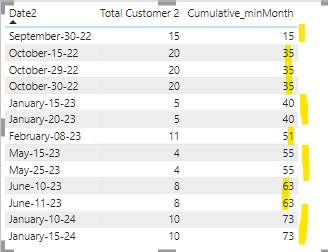Go To
- Power BI forums
- Updates
- News & Announcements
- Get Help with Power BI
- Desktop
- Service
- Report Server
- Power Query
- Mobile Apps
- Developer
- DAX Commands and Tips
- Custom Visuals Development Discussion
- Health and Life Sciences
- Power BI Spanish forums
- Translated Spanish Desktop
- Power Platform Integration - Better Together!
- Power Platform Integrations (Read-only)
- Power Platform and Dynamics 365 Integrations (Read-only)
- Training and Consulting
- Instructor Led Training
- Dashboard in a Day for Women, by Women
- Galleries
- Community Connections & How-To Videos
- COVID-19 Data Stories Gallery
- Themes Gallery
- Data Stories Gallery
- R Script Showcase
- Webinars and Video Gallery
- Quick Measures Gallery
- 2021 MSBizAppsSummit Gallery
- 2020 MSBizAppsSummit Gallery
- 2019 MSBizAppsSummit Gallery
- Events
- Ideas
- Custom Visuals Ideas
- Issues
- Issues
- Events
- Upcoming Events
- Community Blog
- Power BI Community Blog
- Custom Visuals Community Blog
- Community Support
- Community Accounts & Registration
- Using the Community
- Community Feedback
Turn on suggestions
Auto-suggest helps you quickly narrow down your search results by suggesting possible matches as you type.
Showing results for
Register now to learn Fabric in free live sessions led by the best Microsoft experts. From Apr 16 to May 9, in English and Spanish.
- Power BI forums
- Forums
- Get Help with Power BI
- Power Query
- Calculate cumulative each month shown multiple tim...
Reply
Topic Options
- Subscribe to RSS Feed
- Mark Topic as New
- Mark Topic as Read
- Float this Topic for Current User
- Bookmark
- Subscribe
- Printer Friendly Page
- Mark as New
- Bookmark
- Subscribe
- Mute
- Subscribe to RSS Feed
- Permalink
- Report Inappropriate Content
Calculate cumulative each month shown multiple times
01-25-2024
08:25 AM
Hi everyone,
This is the original dataset I have, I want to calculate cumulative total customer each month
Expected Result:
Total customer in column "Total Customer 2" is already total of that month. Cumulative values should be sum of previous month + this month.
Thanks in advance!
3 REPLIES 3
- Mark as New
- Bookmark
- Subscribe
- Mute
- Subscribe to RSS Feed
- Permalink
- Report Inappropriate Content
01-30-2024
01:35 AM
You can calculate running total also in Power Query:
let
Source = Table.FromRows(Json.Document(Binary.Decompress(Binary.FromText("dc/RDYAgDATQXfgm4a4CyizG/dewaCAt0c/mtdf2PAMBhhg2JLQkENGCJVxxEksiJsGSNENuSPN+ROPALltvc2kwIlZwJMgQco0rk1ycFbdIL0MdUp3QiKwzz3FZi/3zofzuuW4=", BinaryEncoding.Base64), Compression.Deflate)), let _t = ((type nullable text) meta [Serialized.Text = true]) in type table [#"Customer No" = _t, Date = _t, #"Customer Sales" = _t]),
ChangedType = Table.TransformColumnTypes(Source,{{"Customer No", Int64.Type}, {"Date", type date}, {"Customer Sales", Int64.Type}}, "sk-SK"),
Ad_YearMonth = Table.AddColumn(ChangedType, "Year Month", each Date.ToText([Date],"yyyy-MM"), type text),
GroupedRowsCustomerYearMonth = Table.Group(Ad_YearMonth, {"Customer No", "Year Month"}, {{"All", each Table.Sort(_, {"Date"}), type table}}),
//Running Total Function - in use 3 times below
fn_runningTotal =
(colName as text, all as table, sales as list)=>
[
cs = List.Buffer(sales),
lg =
List.Generate(
()=> [x = 0, rt = cs{0}],
each [x] < List.Count(cs),
each [x = [x]+1, rt = [rt] + cs{x}],
each [rt]
),
merge = Table.FromColumns(Table.ToColumns(all) & {lg}, Table.ColumnNames(all) & {colName})
][merge],
//fn_runningTotal 1st use
Ad_RTMonthly = Table.AddColumn(GroupedRowsCustomerYearMonth, "RT", each fn_runningTotal("RT Monthly", [All], [All][Customer Sales]), type table),
RemovedOtherColumns1 = Table.SelectColumns(Ad_RTMonthly,{"RT"}),
ExpandedRTMonthly = Table.ExpandTableColumn(RemovedOtherColumns1, "RT", Table.ColumnNames(ChangedType) & {"RT Monthly"}, Table.ColumnNames(ChangedType) & {"RT Monthly"}),
Ad_Year = Table.AddColumn(ExpandedRTMonthly, "Year", each Date.Year([Date]), Int64.Type),
GroupedRowsCustomerYear = Table.Group(Ad_Year, {"Customer No", "Year"}, {{"All", each _, type table}}),
//fn_runningTotal 2nd use
Ad_RTYearly = Table.AddColumn(GroupedRowsCustomerYear, "RT", each fn_runningTotal("RT Yearly", [All], [All][Customer Sales]), type table),
RemovedOtherColumns2 = Table.SelectColumns(Ad_RTYearly,{"RT"}),
ExpandedRTYearly = Table.ExpandTableColumn(RemovedOtherColumns2, "RT", Table.ColumnNames(ExpandedRTMonthly) & {"RT Yearly"}, Table.ColumnNames(ExpandedRTMonthly) & {"RT Yearly"}),
GroupedRowsCustomer = Table.Group(ExpandedRTYearly, {"Customer No"}, {{"All", each _, type table}}),
//fn_runningTotal 3rd use
Ad_RTCustomer = Table.AddColumn(GroupedRowsCustomer, "RT", each fn_runningTotal("RT Customer", [All], [All][Customer Sales]), type table),
RemovedOtherColumns3 = Table.SelectColumns(Ad_RTCustomer,{"RT"}),
ExpandedRTCustomer = Table.ExpandTableColumn(RemovedOtherColumns3, "RT", Table.ColumnNames(ExpandedRTYearly) & {"RT Customer"}, Table.ColumnNames(ExpandedRTYearly) & {"RT Customer"})
in
ExpandedRTCustomer- Mark as New
- Bookmark
- Subscribe
- Mute
- Subscribe to RSS Feed
- Permalink
- Report Inappropriate Content
01-25-2024
11:32 AM
Try this measure:
Cum_MinMonth_Values =
var _mxDt = SELECTEDVALUE(Table1[Date2])
var _t1 = FILTER( ALL('Table1'), 'Table1'[Date2] <= _mxDt)
Return sumx ( SUMMARIZE( _t1, Table1[Date2].[Year], Table1[Date2].[MonthNo], "_sv", Min(Table1[Total Customer 2])), [_sv])
OP:
- Mark as New
- Bookmark
- Subscribe
- Mute
- Subscribe to RSS Feed
- Permalink
- Report Inappropriate Content
01-25-2024
11:39 AM
FYI, You did not ask all three measures, I did for my own check:
RT MinMonth_Values =
var _mxDt = SELECTEDVALUE(Table1[Date2])
var _t1 = FILTER( ALL('Table1'), 'Table1'[Date2] <= _mxDt)
Return sumx ( SUMMARIZE( _t1, Table1[Date2].[Year], Table1[Date2].[MonthNo], "_sv", Min(Table1[Total Customer 2])), [_sv])
RT for each month = CALCULATE( SUM('Table1'[Total Customer 2]), DATESMTD( Table1[Date2] ) )
RT (all values) =
var _mxDt = SELECTEDVALUE(Table1[Date2])
RETURN CALCULATE( SUM('Table1'[Total Customer 2]), FILTER( ALL('Table1'), 'Table1'[Date2] <= _mxDt) )
OP:
Helpful resources
Announcements

Microsoft Fabric Learn Together
Covering the world! 9:00-10:30 AM Sydney, 4:00-5:30 PM CET (Paris/Berlin), 7:00-8:30 PM Mexico City

Power BI Monthly Update - April 2024
Check out the April 2024 Power BI update to learn about new features.






